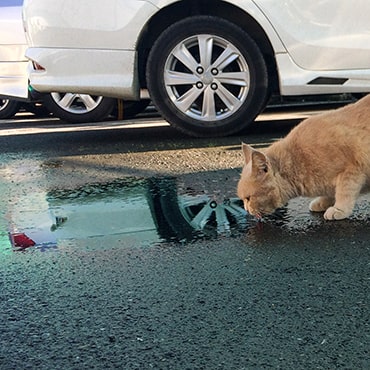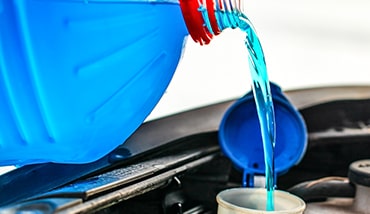Antifreeze poisoning in cats
Overview
- EMERGENCY: call your vet immediately if you think your cat has come into contact with antifreeze.
- Ethylene glycol is found in antifreeze and it can cause severe damage to your cat’s kidneys, even in small amounts.
- Sadly, antifreeze poisoning is usually fatal unless it’s treated extremely quickly.
- It’s important to take sensible precautions to prevent your cat from coming into contact with antifreeze.
Why is antifreeze harmful to cats?
Ethylene glycol, the main ingredient in antifreeze, is extremely toxic. Ethylene glycol is also found in car screen wash, brake fluid, radiator fluid and some garden water features. Even small amounts of ethylene glycol, if swallowed, can be extremely toxic and cause permanent damage to the kidneys. Unfortunately, it is naturally sweet, which is why cats are tempted to drink it from containers, leaky car radiators or driveway spillages. It’s also harmful to your cat if they groom it off their fur or paws after walking through a spillage.
Symptoms of antifreeze poisoning in cats
Once swallowed, the following symptoms can be seen within 30 minutes to 12 hours:
- Vomiting
- Wobbly and weak
- Low energy (lethargy)
- Weeing more than normal to begin, and then less than normal.
- Difficulty or fast breathing
- Seizures (fits)
- Collapse
Contact your vet straight away if you suspect your cat has come into contact with antifreeze or any other product containing ethylene glycol. If your cat has any of the above symptoms and you are not sure if they have come into contact with antifreeze, you should still contact your vet straight away.

Antifreeze spills and leaky engines are a big risk to our pets.

Antifreeze is often in products such as screen wash, brake and radiator fluid.
Diagnosis
It can be difficult to diagnose ethylene glycol poisoning in cats, as many cats come into contact with antifreeze without us knowing. Your vet will examine your cat and may ask if your cat has had any access to antifreeze or if you have noticed any spillages around nearby parked cars. They may also do blood and urine (wee) tests to check your cat’s kidneys.
Treatment
Treatment has a much higher chance of working if it‘s started early, before the kidneys are damaged. Your cat will need to be hospitalised, and treatment is likely to include:
- Medication to make them vomit – this will only help in the very early stages.
- Specific medicine to try to stop the effects of antifreeze.
- A fluid drip to help support the kidneys.
- Washing any antifreeze off their skin and coat.
Prevention
- Use labelled and sealed containers to store any product containing ethylene glycol such as antifreeze, screen wash, brake and radiator fluid.
- Clear up any spillages immediately and fully.
- Dispose of old antifreeze containers - cats may be poisoned by drinking rain water from containers that previously contained antifreeze.
- If possible, buy antifreeze that contains a bittering agent to discourage cats from drinking it. It’s important to be aware this is not completely reliable and cats may still want to drink it despite this.
Cost
Treatment for antifreeze poisoning can become very expensive, so it’s important to speak openly with your vet about the cost of treatment, your finances, and what you think is right for your cat.
Consider insuring your cat as soon as you get them, before any signs of illness start to ensure you have financial support to care for them.
- How much antifreeze is fatal to cats?
- Why do cats like antifreeze?
- Can a cat recover from antifreeze poisoning?
- Will stray cats drink antifreeze?
How much antifreeze is fatal to cats?
Even a very small amount of liquid containing ethylene glycol will cause antifreeze poisoning in cats. They may even be poisoned if they drink rain water from a container that previously contained ethylene glycol.
Why do cats like antifreeze?
Unfortunately ethylene glycol tastes nice to cats as it is sweet.
Can a cat recover from antifreeze poisoning?
If your cat gets treatment very early, there is a reasonable chance of recovery. Sadly, many cats do not recover as it’s not always obvious that they have had access to antifreeze until it’s too late.
Will stray cats drink antifreeze?
Yes, just like any other cat, stray cats are at risk of drinking antifreeze, especially as they might not always have access to fresh, clean water.
Published: January 2024
Did you find this page useful?
Tell us more
Please note, our vets and nurses are unable to respond to questions via this form. If you are concerned about your pet’s health, please contact your vet directly.
Thank you for your feedback
Want to hear more about PDSA and get pet care tips from our vet experts?
Sign up to our e-newsletter
Written by vets and vet nurses. This advice is for UK pets only. Illustrations by Samantha Elmhurst.

